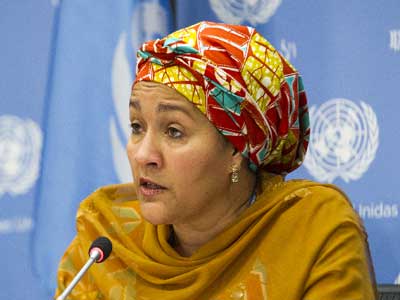
AFTER a week of disagreements among negotiators, the Paris climate summit reached a milestone with delegates agreeing on a 48-page draft document which may be instrumental to their decision-making today as they inch towards adopting a universal pact this Friday.
The landmark achievement was achieved during the weekend when it was agreed at the official close of technical negotiations that the draft climate agreement be used by ministers as basis for further interactions. Nigeria’s Minister of Environment, Mrs. Amina Mohammed, will be joining other ministers from 194 countries in negotiating a universal agreement on climate change.
Over the past week, the draft agreement had been somewhat streamlined and featured bridging proposals that could help ministers work through the political issues underlying the deal, providing them with common-ground options from where to begin their talks.
For the first time, the global civil society groups were optimistic of a climate deal in Paris. “At this point in Copenhagen, we were dealing with a 300-page text and a pervasive sense of despair. In Paris we are down to a slim 21 pages and the atmosphere remains constructive. But that doesn’t guarantee a decent deal. Right now, the oil-producing nations and the fossil fuel industry will be plotting how to crash these talks when ministers arrive,” said Martin Kaiser of Greenpeace.
He continued: “The enemies of a decent deal know they have one week to kill words in the text that commits the world to ‘full decarbonisation’. They know that would set us on a path towards 100 per cent renewables by the middle of the century.
“Those regressive forces will fight instead for words that call for a ‘low emission transformation,’ knowing that such a watered down phrase will do almost nothing to keep fossil fuels in the ground. There is a whole heap of work still to do here in Paris, but as things stand our report card reads: optimistic about the process, less so about the content.”
To Brandon Wu of ActionAid: “Finance is a core part of the UN climate framework and a key driver of the outcome. Without finance, there is no support for the poorest and most vulnerable. There is no just transition. There is no motivation for developing countries to make ambitious commitments. Outside of a few pledges, developed countries are not coming forward to deliver plans, but we simply can not expect ambition without some assurance that there will be assistance.
On differentiation, developed countries have made it very clear that the old two-tiered system will not work. Developing countries have made it very clear that a system in which every country is the same is inequitable and unacceptable. We need a third way, a middle ground, which would need to be developed with a clear set of language, and could be based around indicators on responsibility and capacity.
A senior official of World Wide Fund for Nature (WWF), Sandeep Chamling Rai said: “Countries agree that there should be a global goal for adaptation included in any new climate deal. What we want is that the goal should be linked to science – by ensuring that actions do not allow global temperatures to increase beyond 1.5 degrees Celsius. Already – at one-degree global temperature increase – we are seeing devastating impacts on vulnerable communities and ecosystems which is why countries are calling for strong decision on loss and damage. For many, this is a matter of survival.”



